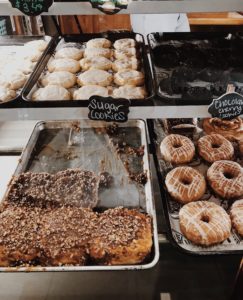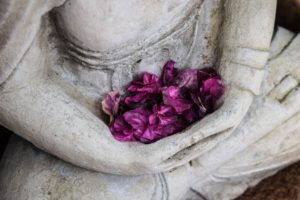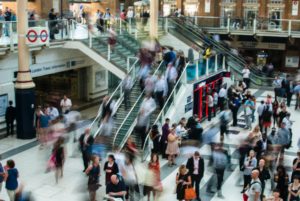by Jenny Rose | Nov 22, 2018 | Aging, Connection & Community, Emotional Intelligence
At 6:30 a.m. on Monday morning, we park in the dark, empty parking lot and use a combination keypad to enter the building and a key to unlock the door to the pool, re-locking it behind us. We turn on lights, computers and automatic doors. We run a shower in the men’s and women’s locker rooms, as the hot water takes several minutes to reach them and the early swimmers complain of cold showers. We check the temperatures and chemicals in the pools. We peel off our winter layers and put on suits, shorts, emergency fanny packs and whistles. We check the day’s schedule. All the while, a rising chorus of voices and laughter comes from outside the still-locked door where the early water aerobics class gathers, as though it’s noon and not O-dark-thirty on a cold November morning. The aerobics teacher gets her music ready and checks the wireless headset. This class is large, so she will teach from the pool deck rather than the water.

Photo by ivan Torres on Unsplash
At 7:00 we unlock the door and they stream in, laughing and talking, tousled heads of grey, white and improbable shades of blonde and brown. Not one of them is under 55. This morning the entire class consists of women. They disappear into the locker room, where the mirth and talk continue as they change and shower. I gather up a rescue tube and get comfortable in the lifeguard chair.
Descending the steps into the pool, the women tease one another and complain about the cold water. Many wear glasses, though they’ve removed their hearing aids. Many wear earrings. A couple of them dispense kickboards, foam buoys and floating foam noodles from plastic laundry baskets on shelves at poolside.
On this morning I count 17 in the class. We know one of them had a birthday over the weekend. The instructor gives her a blue plastic tiara and matching wand from the Dollar Store while we all sing “Happy Birthday.” She’s informed the tiara must stay on her head during the class. She presses it firmly onto her grey hair, laughing.
The instructor cues the music. I jiggle the dial on the wireless speaker, which never seems to work properly, and the class begins with the announcement of a Beatles soundtrack. “Hard Day’s Night” starts the warm-up to a 45-minute water aerobics workout.

Photo by Cristian Newman on Unsplash
Music is so evocative. I can’t hear The Beatles without thinking of my brother, who owned and played all their albums when we were growing up. These women are a decade older than I am, and they greet each song with delight. They know every word. They bob up and down, kicking, twisting, using the kickboards and buoys for resistance and strengthening in the water. Most are generous-bodied and their bosoms bounce within the confines of their modestly cut suits. I see lime green, pink and black. I see loosened skin and wrinkled cleavage, pink scalp and cellulite while “Revolution” fills the brightly lit, echoing space.
The instructor guides the class from one set of movements to another. They stand in place. They travel back and forth across the pool. They lift, bend and stretch in a circle. We all sing together. They inform each other, soulfully, “I want to hold your hand.” The water churns with their efforts. “Got to get you into my life!” they shout at one another with hilarious passion.
As I watch, I try to imagine these well-ripened, glorious women as teenagers. I imagine them hearing “Good Day Sunshine” for the first time on radios, records and jukeboxes in diners, in cars and at parties. They were all young once, pretty, idealistic and probably as foolish as most young women are. They had homework and crushes on teachers. They had families and friends and gossiped. The Beatles were part of the soundtrack of their lives. Now, decades later, what old memories, thoughts and feelings do these familiar songs unlock? What stories do they recall, what pleasures, what griefs and disappointments when they hear “All My Loving?”
The very last song is “Yellow Submarine.” By now even I am breathless with laughter. Impossible to hear this music without moving to it, even if confined in a sitting position. The instructor is incapable with mirth. It doesn’t matter. The class guides itself, arms high in the air over their heads, red-faced, panting, dancing in the water. They turn, bump ample hips with one another, gesture flamboyantly, and we all sing at the top of our voices until the music stops and the class ends.
Knowing the routine, the class puts all the equipment away tidily in the sudden quiet. They pull the lane lines back into place and hook them up. They exit the lap pool and move to the 93-degree therapy pool, where they break into groups and chat, some in the shallow end and others floating peacefully in the deep end. The birthday girl is still wearing her blue plastic tiara. Now the talk is more subdued than it was before the class. I hear a discussion about snow shovels, snow blowers, and the performance of various men, hired and otherwise, with these tools. I hear talk of families, grandchildren and plans for the holidays. A group in a corner carries on a low-voiced discussion interspersed with much bawdy laughter. It’s not hard to imagine what they’re talking about. I smile in sympathy. Local news and politics are dealt with, along with the weather, the state of the roads, church gossip, local holiday activities and fund raisers.
It’s just 8:00 on a Monday morning. These women represent part of the backbone of the community. Seasoned, experienced, humorous and wise in the ways of the world, they know exactly who they are and what they’re made of. They’ve loved and lost, worked, raised families, volunteered, suffered grief, illness and injury. They’re outspoken, earthy and unapologetic. They know how to connect with others. They know how to play and laugh. They are kind and compassionate without being sentimental. They know how to love life.
Monday morning we all lived in a yellow submarine for an hour, and proclaimed it joyfully at the top of our voices.
I wish you all abundance this Thanksgiving.

Photo by Joanna Kosinska on Unsplash
All content on this site ©2018
Jennifer Rose
except where otherwise noted
by Jenny Rose | Oct 18, 2018 | Connection & Community, Emotional Intelligence, Shadows
 I first heard about toxic mimics as I learned emotional intelligence. The term comes from radical environmentalist author and speaker Derrick Jensen. A toxic mimic is a destructive action, behavior or thing pretending to fill a primary human need. Rape is a toxic mimic for healthy, consensual sex. Sugar is a toxic mimic for food. Addiction is a toxic mimic for managing feelings. A job might be a toxic mimic for contribution. Pseudo self is a toxic mimic for authenticity. Some would argue that social media is a toxic mimic for connection.
I first heard about toxic mimics as I learned emotional intelligence. The term comes from radical environmentalist author and speaker Derrick Jensen. A toxic mimic is a destructive action, behavior or thing pretending to fill a primary human need. Rape is a toxic mimic for healthy, consensual sex. Sugar is a toxic mimic for food. Addiction is a toxic mimic for managing feelings. A job might be a toxic mimic for contribution. Pseudo self is a toxic mimic for authenticity. Some would argue that social media is a toxic mimic for connection.
I believe our modern culture here in the United States, at this moment, rests on an edifice of toxic mimics. People who create, design and sell toxic mimics have a simple agenda: Profit and power. We, the consumers and choice makers, the common people, if you will, happily hand over our power in exchange for the shiny; the new and improved; the seductive promise of success, wealth and love; and the popular. Toxic mimics give us the relief of distraction, instant gratification and the promise of an identity. They help us regulate our mood and feelings.
Toxic mimics have such power over us now that a majority of us (maybe) have voluntarily given management of our country to toxic mimics for human beings.

Photo by Patrick Brinksma on Unsplash
What are the strongest human motivators? Fear? Love? Hate? I could also make a case for denial, but that might be too inextricably bound up with fear to separate. Toxic mimics are deliberately designed and marketed to appeal to the things that drive us at our deepest levels. They are engineered to target our greatest vulnerabilities. They seek to hook us, permanently, helplessly and hopelessly, and they’re so powerful they kill many, many people. Witness the power of nicotine, for example. Toxic mimics promise to fill our lives with everything we want and provide us an identity, but when we employ them we feel emptier than ever. Because we are conditioned to believe buying a product or service will make us feel better, we buy as much as we can as fast as we can, which necessitates a continuous stream of money, a resource that has become one of the most powerful Gods we’ve ever worshipped. Money, one might say, is a toxic mimic for God, or Gods, or whatever word you like to use to communicate the divine.
The deepest irony in this situation is we are the ones who perpetuate the power of toxic mimics. We willfully and intentionally participate. We create demand and gobble up supply. We continue to support advertising, algorithms and the handful of powerful companies who monitor our lives and mine us for information in order to sell us yet more toxic mimics. We applaud and admire what we call “progress”, “growth” and a “healthy economy.”

Photo by Ev on Unsplash
A healthy economy. Healthy for who, I wonder. Healthy for the global system? Healthy for those of us living paycheck to paycheck? Healthy for the children who are victims (yes, I mean victims) of anti-vaxxers? Healthy for people who have no financial resource and thus cannot participate in the latest technology? In a country filled with disbonded children and broken families; rising antibiotic-resistant organisms, including STDs; rising illnesses like typhus which are perfectly preventable with vaccination; astronomical housing costs forcing employed professionals to live out of their cars; broken healthcare and public education systems and a population of obese, metabolically disordered, pharma-dependent, addicted, lonely, suicidal people, we have a so-called healthy economy.
Oh, good. I’m so proud to be an American.
It’s a lie. There’s nothing healthy about what’s happening now, but we’re so stupefied, so numbed, so habituated, that we no longer recognize lies when we hear them. We can’t afford to, because to recognize one means to recognize others, and if the whole thing is based on lies, we’re too afraid to know it. Much easier to cash the insurance check and rebuild, for the third or fourth time, in the same place than take responsibility for facing the effects, long predicted, of climate change.
Of course, insurance companies are not going to continue to subsidize climate change because it destroys their profits, so that might catch our attention — eventually.
 In the meantime, we bend our heads over our handheld, shiny, talking, distracting and instantly gratifying techno-screens or settle down in front of our larger screens and surround sound systems and let the advertising and brainwashing wash over us. We call this life. Isn’t it grand? Isn’t it beautiful? Aren’t you happy?
In the meantime, we bend our heads over our handheld, shiny, talking, distracting and instantly gratifying techno-screens or settle down in front of our larger screens and surround sound systems and let the advertising and brainwashing wash over us. We call this life. Isn’t it grand? Isn’t it beautiful? Aren’t you happy?
A toxic mimic is a promise that never delivers. Sometimes we do it to ourselves. Sometimes we allow others to convince us of the necessity, morality and rightness of our toxic mimics. We’re told they will make us safe. They will make us successful. They will make us healthy and popular, beautiful and beloved. We’re told we have a perfect right to have what we want. We long to believe it. We buy, and then we don’t feel successful or beautiful, so we buy some more. We start giving away our power. We begin to hide our unhappiness. After all, toxic mimics are working for everybody else, aren’t they? Everyone on our favorite social media platform is doing just fine. We conclude there’s something wrong, broken and irredeemably ugly about us. It’s too shameful to admit or talk about. We take even more smiling selfies and post them.
Meanwhile, we elevate and empower not the humanitarians, the natural leaders, the ecologists, the visionary scientists, the emotionally intelligent, the critical thinkers and those who understand complexity and systems, but those who have wealth. Money, that amoral symbol made of paper and metal, is the God we’ve agreed is the most powerful and the most admirable. It’s not so, of course, but we make it so with our belief and our participation. We are driven by our fear of losing economically. We’re evidently prepared to follow the promise of economic power straight to Hell.
Fear is the most powerful hallmark of a toxic mimic. Fear of losing power. Fear of being wrong. Fear of consequences, justice and having to take responsibility. Fear of experiencing our feelings. Fear makes our lives, intellect and hearts smaller, not larger. Toxic mimics don’t meet our needs. They momentarily satisfy, perhaps, our cravings and addictions, our need for stimulation and gratification and our desire for distraction. Ultimately, however, toxic mimics dehumanize us, stop our critical thinking, retard our judgement, destroy our health, disable us from healthy connections and encourage us to hide our authenticity. Toxic mimics feed our rigidity, our ideology, our fear and paranoia, and actively attack our physical and mental health.
Are your needs being met? If you don’t know what your needs are, here’s a needs inventory to look at.
If that question made you cry, or your heart shouted “NO!”, make a list of all your makeup, your clothes, your car(s), your tech, your toys and the other stuff you recognize as part of your identity. Don’t forget your accounts, subscriptions and financial assets.
All that, and your needs are not being met?
Huh. Interesting, isn’t it?
All content on this site ©2018
Jennifer Rose
except where otherwise noted
by Jenny Rose | Oct 11, 2018 | Contribution, Emotional Intelligence
When I went through emotional intelligence training, I learned about three basic human needs: Contribution, connection and authenticity. If these primary needs are not adequately met, our lives don’t work well. I’ve written about my wary relationship with my own needs before. As I explore emotional intelligence, I’m struck by the simplicity of the three basic needs, the paradoxical complexity of each one, and the unique ways, often unconsciously, we each approach getting these needs met. I also notice the way these needs are inextricably woven into each other.
In these first couple of weeks of a new job, it’s been necessary to build a new schedule, which felt overwhelming until I remembered the three basic needs. I’m a creature of habit and I quickly stop assessing how I spend my time once I have a workable schedule. I engage with activities I’m accustomed to engage with and that’s that.

Photo by John Salvino on Unsplash
When I trained as a medical transcriptionist and started working from home, I was motivated by the necessity of earning a living and managing my then-teenage sons as a single mother. Medical transcription was a perfect solution. Gradually, without me really noticing, I allowed the job to become a prison. The boys grew up and moved out. I was promoted twice, but never earned a comfortable living. The job came with intense pressure that triggered my stress and perfectionism. It was isolating. It was difficult physically and keyboarding began to give me overuse injury.
I depended on my inadequate paycheck. It was the only income I had.
I was stuck.
I was aware during the last couple of years I worked as a transcriptionist that the job was no longer meeting any of my needs, aside from the paycheck, but a paycheck is kind of essential. In fact, in my mind it was the essential priority in my life, and I labored away in spite of migraine headaches and increasing pain in my upper extremities and shoulders until the day came when I could no longer keyboard without sobbing and I developed a frozen shoulder. I couldn’t take off my shirt without feeling faint from pain.

Photo by freddie marriage on Unsplash
The hardest thing about that job was not the poor pay, but feeling my contribution didn’t matter. The medical professionals were dictating into a piece of equipment and rarely, if ever, considered the human being trying to transcribe their dictation, unless it was to complain and criticize errors. The company I worked for is a huge global conglomerate on the cutting edge of speech recognition technology and a whole host of other businesses. I was nameless and faceless. All training and in-services were done remotely. Management had a high turnover. Changes happened without notice, like getting transferred to a new book of business. Overtime, when needed, was mandatory. Transcriptionists were expected to work 24/7 and weekend shifts were required.
Many people can type quickly and accurately. It’s mostly a matter of practice. I was a pair of hands and ears racing the clock, along with hundreds of others like me, both here and overseas. The job wanted no authenticity from me or anyone else. It’s a job for robots.

Photo by Edu Lauton on Unsplash
I am not a robot.
I’ve been seeking a new job because I want to start earning income again, but this time I promised myself I wouldn’t take a job that didn’t feel meaningful to me, and I knew exactly what I meant by meaningful. A meaningful job is not about the paycheck. Yes, obviously, I need money in today’s world. Not a lot, but some. Enough to justify my time, travel and commitment. However, the work I do in exchange for a paycheck of any size is only meaningful if it makes a positive difference in the lives of others. I don’t want to be paid for being a robot impersonator. I want to be paid because I contribute something wanted or needed out of my own authenticity.
Working as a member of a team in order to keep people safe, assist patients in rehabilitation, and teaching swimming feels meaningful and allows me to work from the heart. In my little corner of the world I can be part of something healthy and healing for myself and others.
As an ex-people-pleaser, I endeavored for most of my life to make a positive difference in the lives of my family and immediate connections. I worked as hard as I could at it, and making a meaningful contribution was my top priority. In spite of all my efforts, I failed. In fact, it seemed the harder I tried the more obnoxious I was to those around me. Naturally, I concluded that I was nothing. I had nothing to offer that anyone wanted. It would be better for everyone if I disappeared and relieved them of the burden of my presence.
Two important things I’ve learned from those years are people pleasing doesn’t work, and some people are determined never to be pleased. I learned to define for myself what a “good” job is. I began to seek paid work I enjoyed as much as volunteer work and kept my focus on the feeling of making a positive contribution.

Photo by Cristian Newman on Unsplash
I see and hear a lot of discussion about the increasing problems of loneliness and depression, and I suspect many of those affected feel unable to make a meaningful, authentic contribution in their families and/or communities. Somewhere along the way we decided a paycheck is more important than the quality of our contribution, but ultimately, as human beings, no paycheck is an adequate substitute for feeling our contribution matters. Our culture does not necessarily reward authentic contribution. We like our infallible robots and good soldiers, those who do and say exactly what they’re programmed to do and say. Loose cannons like me are a problem nobody wants in the classroom or the boardroom.
I’m sorry I believed for so long I had nothing to contribute. It made me miserable and was the root of many destructive choices. Now I believe we all have a great deal to offer, and someone out there needs exactly what we can contribute. What would the world be like if every man, woman and child truly felt they had something unique to give that made a positive difference in just one other life? What if contributing and receiving contributions were not tied to money? What if we all woke up in the morning knowing the world is a better place because of our presence?
What would it take to make that a reality for everyone?
I’m fortunate to have found a way to make an authentic, meaningful contribution combined with a paycheck. Not everyone is able to do that. But everyone is able to do something. Plant a tree. Walk dogs living in animal shelters. Visit hospital patients. Assist in schools, day care facilities or retirement homes. Volunteer to answer a hotline. Buy a cup of coffee for a homeless person. Teach literacy.
Someone out there needs what we can give. Someone is waiting for us. All we have to do is go find them.

Photo by Chris Ensey on Unsplash
All content on this site ©2018
Jennifer Rose
except where otherwise noted
by Jenny Rose | Aug 16, 2018 | Power

Photo by Anna Dziubinska on Unsplash
It’s easy these days to feel overwhelmed and despairing. Life is increasingly unpredictable and the future uncertain socially, economically and in terms of climate. We’ve never before been able to discuss so many issues with so many others, or been exposed to so many different sources of information and opinions. As our public education system flounders, fewer and fewer people think critically, which is daily becoming a more important tool in navigating our information overload.
I heard about a comment the other day on social media directed toward someone discussing women’s rights. The man commenting asked why we’re talking about something like feminism when climate change is so pressing. Why are we wasting energy on women’s rights while the planet is getting more and more difficult to inhabit, not in some hazy future but right now, today?

Photo by Nicole Mason on Unsplash
That question points to the reason we find ourselves in our present situation in the first place. Our social struggles reflect our approach to living on and with our planet. The thinking shaping our social behavior is the same thinking shaping our behavior as citizens on Planet Earth. If we feel we’re entitled to rape, rob or otherwise seize power and control over another human being or group of human beings, we feel equally entitled to use the planet however we want, with no thought of anyone else or the consequences of our behavior. This fertile, life-giving planet is our mother. We live on her body. The degree to which we respect and appreciate her is the degree to which we afford the same treatment to women. It’s the same discussion. It’s not a coincidence that the increasing pressure on our physical survival is happening in the middle of the current social maelstrom.
I’m not a scientist, though I endeavor to be a critical thinker. However, I’ve done quite a bit of reading on the subject of complex systems and earth systems science, including Darwin’s Unfinished Business by Simon Powell, Animate Earth by Stephan Harding, Overshoot by William Catton and Gaia’s Revenge by James Lovelock. Everything I read confirms what I intuitively recognize.
Everything matters. Everyone matters. It’s all connected.
The days are gone when we can tell ourselves what happens on the other side of the world doesn’t affect us and we need not pay attention or worry about it. We have so far exceeded the earth’s carrying capacity for our species that the actions of each individual have an effect on the whole. As human population oozes and bulges into every biome all over the globe, we also directly affect every other form of life: Animal, plant, insect, fungi and microorganism. We displace other species, poison their habitat and compete fiercely for resources. We have no sense of our own needs or the needs of others, but focus on what we want, and we want it all — right now. We deserve it. We have a right to it.
Certain groups of men have no intention of sharing power, dignity and economic resources with women, let alone sharing the planet with fungi and Monarch butterflies. Some groups would eradicate cattle from the globe before learning how to integrate them back into the healthy complex system they were part of until we threw things out of balance with our numbers and ignorance. Others work to bar immigrants, saying they’ll take our jobs, they’ll soak up social resources and they’ll poison our communities with their foreign tongues and culture, too ignorant and short-sighted to grasp we are only enriched and strengthened by the presence of other cultures.
It’s all the same discussion. It’s all connected.

Photo by NASA on Unsplash
We are only now beginning to glimpse the miraculous web of life on Earth, only now getting a sense of Earth as a sentient complex system, self-regulating and self-sufficient, and the knowledge may have come too late. Complexity is life. Complexity is resilient and creates the ability to learn and adapt. Any behavior or ideology seeking to minimize, disrupt, or eradicate complexity is destructive. Those who work for purity, for homogenized patriotism, for the complete power of one religion, sex, diet, complexion, body type or expression of sexuality are actively tearing apart our world and our future.
Our inability to live peacefully and cooperatively with one another is our inability to respect and care for the land under our feet. Our willingness to tolerate slavery, sex trafficking and bureaucracy that destroys families, indigenous groups, human rights, reproductive choice and other natural resources is the same willingness to worship the false idol of money, buy whatever we want when we want it and discard it later with impunity. If we can’t buy what we want, we take it, or steal it. This is the definition of rape culture.
Complexity is about integration. One way to interpret the old stories is to consider each character as a separate part of the same psyche. In other words, we all have an innocent Red Riding Hood maiden inside us, and we all have an old bedridden grandparent, a parent who warns us of the dangers of leaving the path, a wily predator and a heroic figure who saves the day. A healthy adult learns to know and accept his or her shadow side, as well as more admirable characteristics. Spiritual wholeness consists of a well-balanced masculine and feminine, no matter our biological sex. If we are unable to integrate all these voices and archetypes, all these facets of personality, feelings and thoughts, and operate as a whole complex psyche, we’re crippled, and we’re certainly going to be unable to take our place as an effective, joyous and elegant part of the wider complex system of Planet Earth.
So yes, it matters. It matters if you use a plastic straw and throw it away. It matters if you toss your plastic cup out the car window. It matters if you support the tobacco industry because they’ve successfully addicted you. If you throw one less item away today, it matters. If you recycle and compost, it matters. If you stop rototilling your garden, which damages the soil, it matters. The way you treat the people and animals around you matters. We don’t have the power to stop or change the enormous transition we’re caught up in by ourselves. We may never see validation, recognition or negative consequences for the choices we make, but those choices do matter, because we’re all inextricably connected, like it or not, deny it or not.
Megastorms matter. Lead in drinking water and cancer clusters matter. Water conservation efforts in Cape Town matter. Antibiotic-resistant bacteria matter. Fires, earthquakes and volcanic activity matter.
People matter, too. Our experience, feelings and thoughts matter. I don’t matter more than you or anyone else, but, as a living creature on the planet, I matter. The way I treat myself matters. My health matters, and my creativity, and my ability to learn.

Photo by Gabriel Jimenez on Unsplash
If we can’t wrap our heads around the essential value and importance of each life, including our own, and support each individual in their personal power, we will absolutely destroy all non-human life on the planet and ourselves with it. If we’re really serious about equal rights, we need to learn to share our rapidly diminishing resources, and I don’t mean cars, technology and food delicacies grown half a world away. I don’t mean diamonds, designer clothing, private airplanes and yachts, and mansions housing a family of four. I mean basic food, clean water and habitable land. We each need to take responsibility for our addiction to instant gratification, convenience and all the latest tech, toys and trends. We need to let go of our entitlement and work together to create a sustainable standard of living for everyone.
So yes, food and water politics, sexual identity politics, human rights, healthcare, education, families and children and immigration all matter. They’re all road signs and mile markers. The question is whether we’ll travel in the direction of destruction or use these issues as opportunities to build bridges, enlarge our empathy and heal our disconnection from ourselves, from other humans, and from all other life, paving the way to managing climate change as elegantly as possible.
I know what direction I’m going in, not with hope of reaching some kind of utopia, but because it’s the only direction that makes any sense to me. Many, many people disagree with me, I know, and I’m going to have to fight the mob going in the direction of destruction. That’s okay. I never seem to be traveling in the direction of the majority, so I’m used to it, and there will be others going my way.
In the meantime, I walk the tightrope suspended over the paradox at the heart of modern life. I fight to maintain power and authority in my own life and use it for the greater good as well as my own benefit. At the same time, I acknowledge I am but one life among uncounted living beings on the planet, spinning through space with everyone else towards an uncertain future. My power is present, but limited. If I make even the smallest difference for good in my lifetime, I’ll probably never know, and no one else will ever see, and that’s okay with me.
It still matters.

Photo by Ivan Jevtic on Unsplash
All content on this site ©2018
Jennifer Rose
except where otherwise noted
by Jenny Rose | Jun 14, 2018 | Connection & Community, Emotional Intelligence

Photo by James Coleman on Unsplash
Saturday night I attended a monthly open mic event called The Coffeehouse. It took place in the basement of a local church, which is also where our Tai Chi group meets. People came from far and wide to participate. I was there to tell stories for the first time since I came to Maine.
My partner came with me, and I knew two other people there from Tai Chi. Otherwise, everyone was a stranger. I sat quietly in a corner and watched the place gradually fill up. I could see many of these folks were old friends. In fact, during the course of the evening I learned that The Coffeehouse has been happening for more than 20 years in that very basement, hosted by the same man since the beginning. I heard stories, both on mic and off, of cancer, divorces, moves, jobs, remarriage and grandchildren.
Cases were opened and out came guitars of every description. Musicians sat together, teaching one another chords and fingering, and playing together. Ragged sheet music, song lyrics and notes lay on every table. In front of the mic, I heard about being a cafe musician, playing music for weddings, and stories from a couple who composes, writes and performs music together, splitting their time between Arizona and Maine.

Photo by Brandon Wilson on Unsplash
One man stood up and read a short story he’d written. Another gave a hilarious rendition of a Shel Silverstein poem I used to read aloud myself as an elementary school librarian. Yet another read one of his own poems in between playing his guitar. A woman performed on her autoharp.
Many of the performers expressed nervousness, but each was volubly supported by the audience. Jokes were cracked, stories exchanged. Everyone was applauded warmly, including me.
When it was my turn, I stood before them, my heart throbbing uncomfortably in my chest, looking out at a roomful of faces I’d never seen before. I introduced myself briefly and told a short peace tale from China, followed by a longer story from Jane Yolen. The audience was generous, attentive. The poignant memory of other, more familiar audiences in my old place caught at my throat. As I wove the stories, I looked from face to face, speaking directly to each one as though we were alone. Their expressions softened as they entered into the stories with me, seeing what I was seeing and feeling what I was feeling. I know my own face wore exactly that expression as I listened to their music and songs.
Each performer took his or her fifteen minutes or so to share their art. It was a long night. In fact, it started about the same time I like to be heading for bed. Yet that evening fed something in me that’s been starving for three years. I had a strange sense of coming home, of belonging and kinship.

Photo by Andrew Loke on Unsplash
My partner and I talk a lot about community, how essential it is, how to create it, how to join it and how to support it. I believe, as humans, we must find some kind of community to meet our connection needs if we want to live well. We’re social animals, and I think we’re beginning to see the high cost of isolation and disconnection play out in suicide rates, violence and addiction.
The Coffeehouse clarified for me an aspect of community I haven’t really discerned before. Right now, the world is chaotic and increasingly complex. We’re faced with serious issues and changes we’re ill-equipped to deal with. I’ve been thinking about the local food movement, grassroots politics, permaculture, and alternative energy and housing through the lens of community. All of those issues are vitally important, and becoming more so by the day, but I’ve been skipping over the most important thing community can give us, the aspect that must be present, supported and nurtured before any kind of problem solving or effective organization can happen.
The Coffeehouse is, essentially, an adult playgroup. I heard nothing about diet, gun control, immigration, politics or climate change. I heard nothing about social justice or gender politics. We all shared the same bathroom, the same coffee and snacks. We all put a voluntary donation in the basket. Instruments were shared. We shared time, microphones, personal stories and creativity. There was no talk of cultural appropriation.
We laughed together.
We played together.
We were kind and generous with each other.
We took turns.
As I sat there watching it unfold, it occurred to me to wonder how we’re ever going to manage to address all the pressing problems in the world today if we can’t come together as human beings and play with one another first. How do we find our way to collaboration and cooperation unless we build trust and respect and are able to just have fun together? The Coffeehouse showed me humans at their best. Heck, I was at my best. In such a warm and supportive atmosphere, my social anxiety was not disabling. People talked to me, welcomed me, expressed appreciation for the stories and received my appreciation for their contribution in return. I recognized several who performed were more nervous than I was. None of us were hiding behind technological screens. There was no escaping a forgotten lyric, the wrong chord or symptoms of performance anxiety. One of the musicians talked ruefully about a new tremor in his hands that impeded his playing. We could all see it. He played anyway.
In the days since The Coffeehouse, I know I’ve found something I’ve been looking for since I came to Maine. I thought I just wanted a place to share stories again, and I do, but this gathering is about something much bigger than that. This is about mutual authenticity, creativity, contribution and play. It’s about friends. It’s about celebration and connection in the midst of a dark and stormy time.
I can hardly wait for the next one.

Photo by rawpixel.com on Unsplash
All content on this site ©2018
Jennifer Rose
except where otherwise noted



















